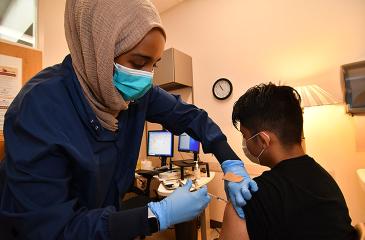When the Richard M. Schulze Family Foundation issued a $1 million challenge match to provide more support for underserved Twin Cities communities, Otto Bremer Trust quickly answered the call
The University of Minnesota’s Community-University Health Care Center (CUHCC) has received a $1 million philanthropic investment from the Richard M. Schulze Family Foundation (RMSFF) to help meet the health care needs of those who are working and still face challenges in accessing vital medical and dental services due to limited incomes. The investment, issued as a “challenge match,” was intended to inspire other donors to support CUHCC and its expansion of integrated care for those who need it most.
“Dick Schulze and his family have always been concerned that quality health care be available to everyone in need of it,” said RMSFF CEO Mark Dienhart. “Our board is impressed with CUHCC and the University of Minnesota’s plans for it, and we are delighted to partner with others who feel the same way.”
Inspired by the challenge posed by RMSFF to support the medical needs of uninsured and underinsured patients, the Otto Bremer Trust (OBT) contributed $1 million to galvanize efforts to not only meet the immediate needs of CUHCC patients but also to launch new projects aimed at reducing inequities or disparities in access to care by helping communities build on what they themselves identify as needs and solutions.
“We admire the commitment of the Richard M. Schulze Family Foundation to CUHCC and we are honored to partner with them on this important project,” said Brian Lipschultz, co-CEO and Trustee, OBT. “The Otto Bremer Trust regularly supports many University of Minnesota programs as we deem them vital to our region’s health care.”
Each year, CUHCC providers care for more than 10,000 patients, the majority of whom identify as a person of color, immigrant, refugee, or indigenous; live below the federal poverty level; and are uninsured or underinsured. CUHCC serves many patients who are considered essential workers who struggle to afford health care services. These individuals incur high deductibles and rely on a sliding fee scale to get the preventive and acute care they need. In addition to providing traditional medical and dental care, CUHCC offers mental health services, midwife services, case management, pro bono legal services, language interpretation, patient advocacy, and more.
“At CUHCC, we are very proud of the work we have done for decades to improve access to quality health care for underserved populations in the Twin Cities,” said Colleen McDonald, CUHCC CEO. “We are so grateful for the support from RMSFF, OBT, and other philanthropic organizations who have stepped up in a profound way to help CUHCC serve even more people, more effectively, with quality health care and other services. Expanding our services and ensuring those in need have access to care have been even more critical during the pandemic.”
CUHCC has delivered accessible, culturally responsive care to some of the most diverse and low-income communities in the city and surrounding regions throughout the pandemic. Thanks to this additional philanthropic support, CUHCC will be able to quickly pivot care models to expand mobile sites, increase training for patients and providers on telehealth visits, extend clinic hours, and explore other opportunities to meet patient needs, including much-needed community health workers.
Though the $1 million challenge grant has already been met, this effort serves as a launch to make a huge difference in health care in our community. We invite other donors to join in the momentum that these transformative gifts have started. To make a gift to these critical needs in our community, visit z.umn.edu/supportcuhcc.
###
About University of Minnesota Community-University Health Care Center
Located in South Minneapolis, the Community-University Health Care Center (CUHCC) is a Federally-Qualified Health Center (FQHC) and Minnesota’s first community health center. CUHCC successfully integrates health and wellness care and provides culturally responsive care to meet the needs of Twin Cities residents. Through CUHCC’s cutting-edge, team-based education and training center, the clinic educates hundreds of health science students and future health care providers annually. Recognized as a Community Health Center Quality Leader for achieving top clinical performance measures among FQHCs nationwide, CUHCC ranks high in providing comprehensive medical, dental, and mental health care to more than 10,000 people per year.
About Richard M. Schulze Family Foundation
The Richard M. Schulze Family Foundation was created in 2004 by the founder of Best Buy to give back to his home communities in Minnesota and Florida. The foundation works in the areas of human services, health and medicine, and education. Visit https://www.schulzefamilyfoundation.org/
About the Otto Bremer Trust
The Otto Bremer Trust is a private charitable trust and bank holding company based in St. Paul, Minn., that works at the intersection of finance and philanthropy. Created in 1944 by Otto Bremer, it is today one of the region’s largest philanthropic organizations and is committed to supporting a better quality of life for residents of Minnesota, Montana, North Dakota, and Wisconsin. OBT is the majority owner of Bremer Financial Corporation, a regional financial services company, manages a diversified investment portfolio, and operates Community Benefit Financial Company, a financial resources subsidiary. Since its founding, OBT has invested more than $900 million in people, places, and opportunities in the Upper Midwest. Visit ottobremer.org.



